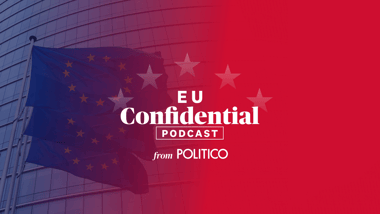
Press play to listen to this article
Voiced by Amazon Polly
This article is part of a special report: Berlin in Brussels.
BERLIN — German is coming.
English may be the European Union’s lingua franca, but listen carefully in the corridors of power and you’ll find the language of Goethe and Schiller is on the rise.
German is gaining ground among the EU’s three official working languages as Berlin prepares to take on the bloc’s presidency next month. That’s not least because native speakers occupy top positions, including Ursula von der Leyen at the Spitze of the European Commission.
You may like
Those in the Brussels bubble are taking note.
The proportion of German speakers rises as you climb the Commission organigram.
The Goethe Institute, Germany’s state-funded cultural outpost, told POLITICO it saw a five-fold increase in demand for its free language tuition service for diplomats and journalists in Brussels between 2012 and 2019.
That’s part of Europanetzwerk Deutsch, a state-funded, soft power initiative to lift those with some knowledge of German into working proficiency.
Worldwide, some 15.4 million people are now learning the language, according to a five-year review published this month by the German government. Compared with the last survey in 2015, there’s a 62 percent rise in Denmark, 16 percent in France and 30 percent in the Netherlands, while 2 million Poles are now practicing their der, die and das.
Any lingering historical sensitivity around promoting German as an international language has been replaced by the gravitational pull of Europe’s largest economy, helped by the country’s modern image as a bulwark of liberal values.
Despite only 8 percent of the Commission’s 33,000-strong workforce holding German or Austrian nationality, the proportion of German speakers rises as you climb the organigram. Commission Executive Vice President Frans Timmermans is fluent, for example, as is the Spanish ambassador to the EU, Juan Pablo García-Berdoy.
“People tell us that German language skills help them in their jobs and with their careers in the Brussels bubble,“ a spokesperson for Germany’s permanent representation said, noting the increased interest ahead of the EU presidency.
The language has also benefited from the bloc’s eastward expansion, with German investment pouring into Central and Eastern Europe over recent decades. “From the new member countries of the EU there are lot more diplomats that are fluent in German,” said one diplomat, who is fluent in German.
Von der Leyen’s presentation of the proposed coronavirus recovery package to the European Parliament late last month offers an example of the language’s usefulness. While the Commission president began the speech mixing between English and French, she switched to German for the more sensitive details aimed at allaying fears that the plan would lead to debt mutualization via the back door.
Meanwhile, the Brussels representations of Germany’s richer federal states have become popular venues for networking events and wonky policy debates, often in German.
In print, too, German papers are to be scoured for Brussels gossip. In 2017, the Frankfurter Allgemeine Zeitung had the gory account of then-Commission President Jean-Claude Juncker’s “disastrous Brexit dinner” with Britain’s then-Prime Minister Theresa May, while last year Welt readers were the first to have the news that von der Leyen planned to build an apartment next to her office.
“We are used to reading in German press leaks of what we just discussed,” one diplomat complained recently.
Sprechen Sie Deutsch?
While Brexit leaves just Ireland and tiny Malta as the EU’s English anchors, not everybody is predicting a change in the language of diplomacy.
“I think we’ve all gotten used to the fact that the lingua franca of Europe, and of the EU, is English, regardless of whether the United Kingdom is a member or not,” said Wolfgang Ischinger, a former German ambassador to the U.K. and U.S., who runs the Munich Security Council.
French, Europe’s traditional langue diplomatique, has only begrudgingly made way for its Anglo-Saxon rival. The language is entrenched, and robustly defended in international institutions from Brussels to Geneva. Its champions are unlikely to welcome another challenger into the duopoly.
As German starts to become more prominent in the EU capital, expect a growing influence on what’s known as “Brussels English.”
“You can expect anyone working in Brussels to be completely fluent in English and French,” said David McAllister, a bilingual German conservative MEP who chairs the European Parliament’s foreign affairs committee. But, he added, “it gets difficult if you say, ‘I would like to speak German.’”
And while German counts more native speakers and a legacy as the language of science and exactitude, it isn’t the most welcoming for newcomers; the American writer Mark Twain once dismissed it as a language “only the dead have time to learn.”
But for those who dare to try there are advantages.
For a start, German syntax, in which verbs are often flung to the end of a sentence, is better-suited to holding attention. “It forces you to listen, because the verb is … at the end, and that means people don’t interrupt,” said Uwe Rau, a deputy director at the Goethe Institute.

A voting session during at the European Parliament in Strasbourg | Frederick Florin/AFP via Getty Images
Compound nouns also allow Lego-like constructs to spring up. For example, anyone aiming to express Europe’s need to rescue its global status will need a paragraph in English, but only a 48-character word in German: Weltpolitikfähigkeitsverlustvermeidungsstrategie, coined by British academic Timothy Garton Ash last year.
As German starts to become more prominent in the EU capital, expect a growing influence on what’s known as “Brussels English,” a bureaucratized dialect peppered with soupçons of French. The entry into the lexicon of the word Spitzenkandidat already marks one success. Brexit terminology might offer an indication of what’s next.
While Brits “pick cherries” but “can’t have their cake and eat it too,” Germans “pick raisins” but “can’t dance at two weddings at once.” If those expressions ever start to get tossed around the conference room, you’ll know that German has arrived.
Hans von der Burchard, David M. Herszenhorn and Florian Eder contributed reporting.









